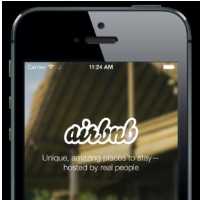Santa Monica Adds a New Twist to Crackdown on Airbnb

Sharing-economy startup Airbnb has clashed with local, state and international governments over its innovative business model that skirts paying taxes levied on the rest of the hospitality industry and exacerbates housing shortages.
But Airbnb officials failed to have an appreciation for Santa Monica’s innovative government model for regulating the company that not only taxed the hosts who rent out their homes but required them to be in town when occupants are there. They said that had never been done before and the Los Angeles Short-Term Rental Alliance threatened legal action.
The city council voted unanimously Tuesday night to require hosts who get short-term renters via the Airbnb app (or a similar service) to get a business license and pay a 14% tax. Rentals cannot last more than 30 days. Hosts would be required to inform the city of each rental, including the client name and address, the price paid and length of stay. The ordinance takes effect in 30 days and punishes violators with a $500 fine.
The law comes a month after a report (pdf) from the Los Angeles Alliance for a New Economy said Airbnb is squeezing the already-tight L.A. housing market and is being gamed by entrepreneurs, who are anything but mom-and-pop renters and homeowners. Nearly 90% of Airbnb revenues in Los Angeles “are generated by lessors with whole units and leasing companies who rent out two or more whole units,” according to the report.
“In places where vacancy is already limited and rents are already squeezing people out, this is exacerbating the problem,” author Roy Samaan told the Los Angeles Times.
That was an argument taken to heart by council members in a city with a shortage of affordable housing, some of the county’s highest rents and a lot of tourists looking for short-term bargains. The city’s website explaining the ordinance warned that “entire apartment buildings have begun to only offer vacation rentals, essentially turning an apartment building into a hotel in a residential neighborhood.”
Airbnb costs cities hotel tax revenues, disrupts communities with transients, complicates parking, reduces vacancy rates and ramps up rental prices. That sounds pretty good to investors, who have poured big money into the company, which is valued at $13 billion. That is considerably higher than the Wyndham ($9.3 billion) and Hyatt ($8.4 billion) hotel chains.
The council also heard from a slew of hosts on Tuesday who thought Airbnb was a godsend and shouldn’t be tampered with. Fans of the service say it uses modern technology to facilitate tourism, maximize the use of available housing stock, provide income for hosts, introduce lower-priced competition into the marketplace and empower individual travelers.
The new ordinance distinguishes between “home-sharing” with a guest and “vacation rental” of a separate unit. The latter has always been prohibited in residential areas, but rarely enforced. The city says that will change now and will affect about 1,700 vacation rentals. Both types of rentals will be subject to the tax and reporting requirements.
San Francisco passed an Airbnb ordinance that took effect in February, but less than one-tenth of the estimated 5,000 Aribnb hosts registered as required. The city is considering a tweak. Los Angeles is pondering passage of an ordinance and other cities, including Malibu and West Hollywood, have tightened their rules on vacation rentals.
State lawmakers are also taking a whack at regulating home-sharing cyber platforms with Senate Bill 593. The bill, which is in the committee hearing process, would require online vacation rental sites like Airbnb not to book in California cities and counties with ordinances banning their activities. It would also require the sites to gather the same kind of data Santa Monica requires about renters.
The information requirement has drawn the attention of privacy advocates who share the essence of Airbnb’s stated position that, “The law would require platforms to hand over large swaths of confidential, personal information to city regulators who will sift through this data in search of potential zoning code violations.”
That assertion has not been tested in court.
–Ken Broder
To Learn More:
Santa Monica Council Unanimously Approves Airbnb Regulations; Hosts to Pay Tax (by Kristen Lepore, KPCC)
Santa Monica Comes Down Hard on Airbnb, Will Crackdown Spread? (by Tim Logan, Los Angeles Times)
Airbnb, Channeling Uber, Mobilizes Customers in Dogfight over Regulation (by Allen Young, Sacramento Business Journal)
Airbnb Smackdown: Hosts in Santa Monica to Pay Tax (by Justin Wm. Moyer, Washington Post)
Airbnb Squeezing Already-Tight L.A. Housing Market as City Ponders Options (by Ken Broder, AllGov California)
Overview of the Home-Sharing Ordinance (City of Santa Monica)
- Top Stories
- Controversies
- Where is the Money Going?
- California and the Nation
- Appointments and Resignations
- Unusual News
- Latest News
- California Forbids U.S. Immigration Agents from Pretending to be Police
- California Lawmakers Urged to Strip “Self-Dealing” Tax Board of Its Duties
- Big Oil’s Grip on California
- Santa Cruz Police See Homeland Security Betrayal in Use of Gang Roundup as Cover for Immigration Raid
- Oil Companies Face Deadline to Stop Polluting California Groundwater





